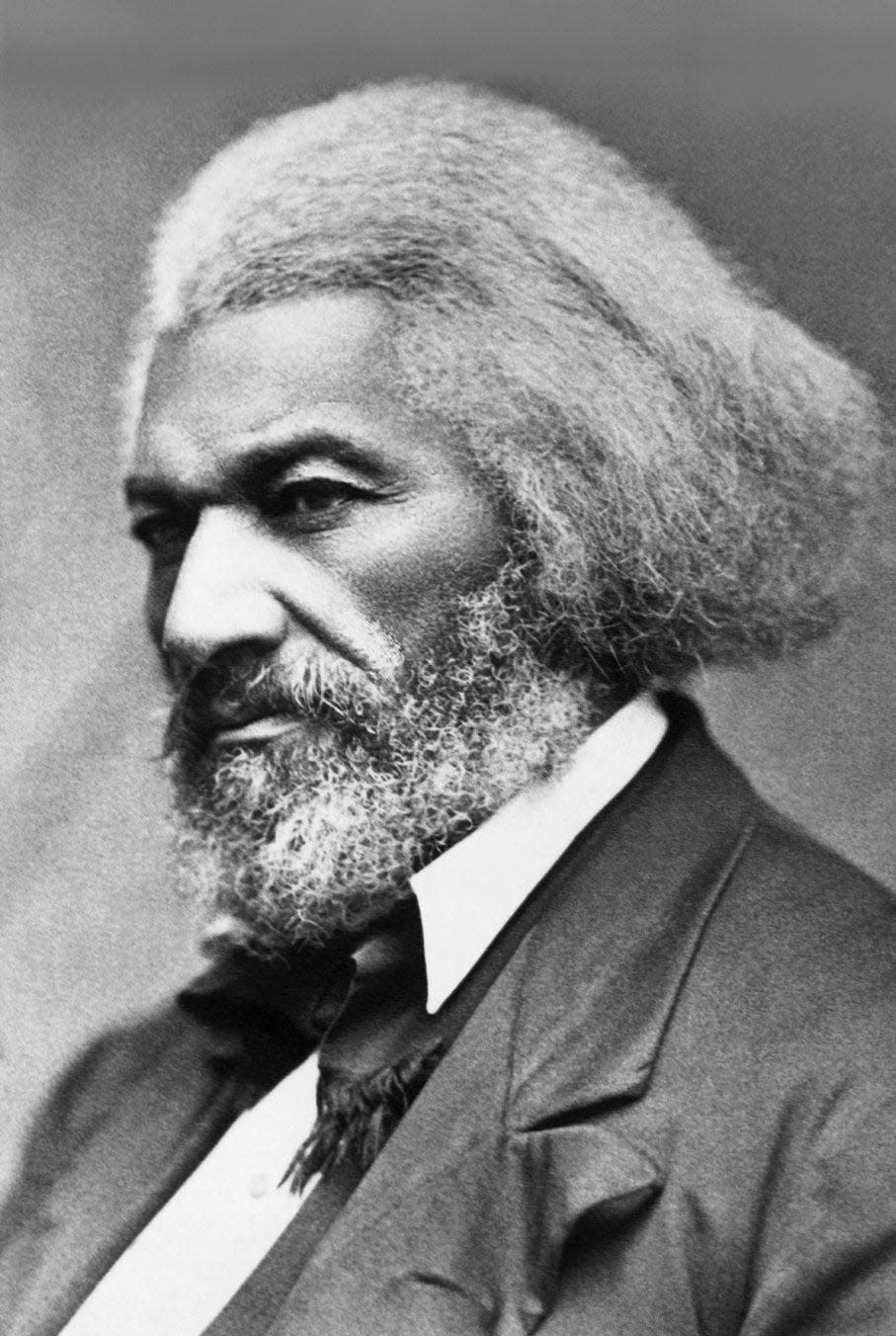Inspirational figure Frederick Douglass pelted with eggs in Richmond
- Oops!Something went wrong.Please try again later.
The first week of September 1880, the leading spokesman for blacks of his time and an inspirational American of historical significance spoke in Richmond.
This was not his first time here.
Decades prior, Frederick Douglass spoke at an abolitionist meeting in Richmond on October 6, 1843, and had been pelted with eggs.

The Richmond Palladium at the time denounced the action as “disgraceful.”
The paper did not mention the speaker’s name, but Douglass targeted the town in his autobiography [1881], “My Bondage and My Freedom: the Life and Times of Frederick Douglass” …and identified Richmond.
Thirty-seven years later this most famous African American returned.
Frederick Douglass, the “old man eloquent of the colored race,” was heading to Fountain City to memorialize the Levi Coffin House, an important station of the Underground Railroad.
When he arrived by rail on Sept. 2, 1880, at the Richmond depot with about 300 followers, there was a grand ovation.
Half a dozen militia and brass bands from Williamsburg, Fountain City and the Whitewater area played.
Douglass appeared on the platform and said, “I have sometimes appeared as a slave and sometimes as a fugitive slave, but now thanks to providence I appear no longer as a slave, no longer as a fugitive, but as a man. I am a man among men. I’m no longer mere chattel but a citizen of this great republic… I met in Richmond this morning a man* who, years ago, saw me tied with my hands and arms crossed, and dragged by a rope behind horses over the gravel and stone of a rough road for fifteen miles to an Easton [Maryland] jail, for attempting to escape captivity in that state. He saw the man who locked me up and he saw the slaveholders and the buyers who felt my muscles to determine my worth in paltry gold. I was to be sold because I attempted to gain my liberty. I have been asked why I was not happy and content with my good master because I had plenty to eat and wear. I will tell you as I did my old master, years after, when I asked him if he thought I did right or wrong in running away; he said he would have done the same under the same circumstances. I told him I did not run away because I hated him, but because I loved liberty more; that I did not leave Maryland because I hated Maryland, but because I wanted to be free. The soul that is in me no man can cage!… I have spoken to hundreds and to thousands; I have spoken in all the large cities and I have spoken on both continents; I have spoken in the cities of old England, but on no occasion in my life have I felt greater embarrassment than today. Every now and then things have confronted me since I have reached Richmond that tended to effect me, and I am haunted by what happened to me here.”
At this juncture drizzling rain pelted down pretty lively and Mr. Douglass added, “God reigneth in all, especially the weather” and withdrew.
He pilgrimaged to Fountain City and spoke, and returned to stay the night in Richmond.
He was asked to speak at Phillips Hall [northeast corner of 6th and Main].
Douglass agreed despite his exhaustion, and the word spread through town “like wildfire unleashed.”
The hall was crowded to utmost capacity.
Mayor Thomas W. Bennett introduced Frederick Douglass.
The most famous black man of his time and one of the most important men in American history looked out into the Richmond audience, not too far from where he had been pelted with rotten eggs decades before, and saw a sea of upturned faces “beaming with that happiness only vouchsafed to the free,” glad that he had attained liberty.
According to the Sept. 9, 1880 Richmond Telegram, “When Mr. Douglass got started he seemed to forget his fatigue and continued for about an hour in a strain of eloquence, logic and humor surpassing almost anything ever delivered to a Richmond audience.”
During the speech he talked about the disgraceful treatment he’d received in Richmond.
“Thirty-seven years ago I appeared in your midst. My back was all covered with gashes from the slave driver’s whip; clubs and canes had produced great scars on my head; my feet were shoeless and bleeding. When I came into your streets I was pelted with eggs by unsympathetic fellow beings. But now, how changed the scene around me! I am accepted! The shackles have been knocked off the limbs of four million human beings, and the black man and woman and child are clothed in all the rights of citizenship. I came to Richmond the first time a fleeing fugitive, chased by bloodhounds and savage men. No man can put a chain about the ankle of his fellow man without at last finding the other end fastened about his own neck. Now I am your brother and I stand before you as a fellow citizen. Thank you.”
Frederick Douglass stayed the night and took the train the next day, heading into history.
His experience in Richmond was cathartic and healing.
A low point of area history was when this distinguished American was pelted with eggs and disgraced by our citizenry.
But he returned… and forgave us.
*Richmond’s Charles E. Jenkinson had lived in Maryland and seen Douglass arrested as a fugitive, beaten and dragged to jail. Jenkinson later moved to Richmond and had attended an 1843 abolitionist meeting in the old Warner Building [approximate site: across the street east of the Wayne County annex] where Douglass was splattered with rotten eggs. Jenkinson’s home was also splattered with eggs.
Contact columnist Steve Martin at stephenmonroemartin@gmail.com.
This article originally appeared on Richmond Palladium-Item: Inspirational figure Frederick Douglass once spoke in Richmond

